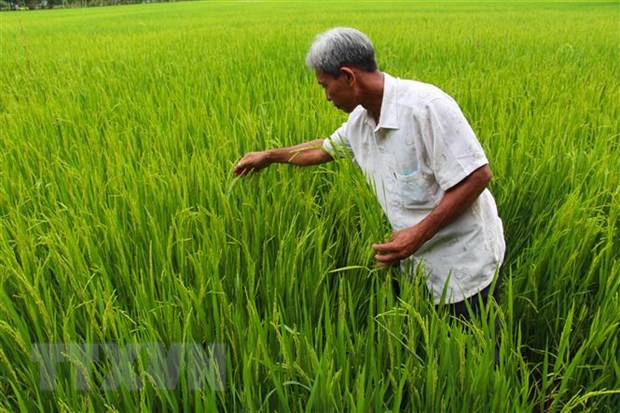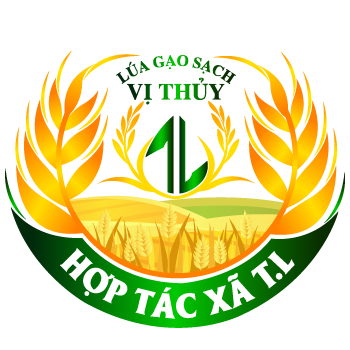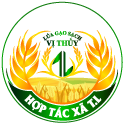Hau Giang: Vi Thuy clean rice gradually gains a foothold in the market
With the goal of changing farming habits and creating safe products, Tan Long cooperative, Vi Thuy district, Hau Giang province is building rice fields without using chemical drugs.
Up to now, the cooperative's "Vi Thuy clean rice" product is gradually gaining a foothold in the market and has been recognized as a provincial OCOP (One Commune One Product) product with great potential for development. .
Changing farming methods
The rice fields of Tan Long cooperative, Tan Long hamlet, Vinh Tuong commune, Vi Thuy district, are currently in the flowering stage.
With 51 members, producing on an area of 59ha, this is the second year that the cooperative has carried out organic rice production with strict processes.
Before entering the new crop, the stages of soil treatment, weed control, and chemical isolation are all done very carefully. Seeds also do not use germination stimulants but are soaked and planted naturally.
During the farming process, farmers only use organic fertilizers and pesticides.
Talking about the first steps of the path of organic rice production, Mr. Nguyen Van Thich, Deputy Director of Tan Long Cooperative, said that in the past, the cooperative grew rice according to the long-standing habit of farming, using a lot of pesticides and chemical fertilizers. Investment capital is high, land is polluted, health is affected after each rice crop, but the value of rice grain does not increase.
Since then, the cooperative leadership asked why not produce according to social needs, which is the need to use quality food, without affecting health later, and decided to switch to production. Organic rice, without the use of fertilizers or chemical drugs since 2019.
The transition to organic rice production was initially difficult, because people were not familiar with the new farming method, and the yield of organic rice was not as high as that of inorganic rice.
However, from the success of the first rice crops and realizing the health and environmental benefits of organic production, up to now, members of the cooperative are very supportive of the new and applied way of doing things. proficient use of VietGAP process.
There are 5.2ha of rice applying the organic rice production process, Mr. Chau Thanh Bach, a member of Tan Long Cooperative shared since applying the production process towards organic, with the creation of clean products, safe for consumers, in the cultivation process, it also protects the health of farmers because no chemicals are used; The chemical pollution on arable land is also much limited.
The care of the new farming method is also lighter because each crop is only sprayed with organic pesticides twice, but still controls most diseases on rice.
A unique way of taking care of rice in the farming process of Tan Long cooperative is that farmers use a mixture of fresh milk and raw chicken eggs to spray to prevent pests.
According to farmers, this mixture helps thicken rice leaves and make them bigger, so the worms cannot roll the rice leaves, attracting many natural enemies to protect the rice plants.
Not only members of the cooperative, those who live off the local sprayer also agree with organic rice farming. Because they are the ones most affected when using chemical drugs.
If in the past, farmers only used output and productivity as a measure for the efficiency of farming methods, now, the value of the product is becoming a criterion for cooperative members to evaluate and also a basis for cooperatives to mobilize farmers to associate and convert towards organic production.
According to statistics through the first rice crops, the yield of rice produced in organic form is on average from 5.2-5.5 tons/ha, only 0.5-0 lower than inorganic rice production. 8 tons/ha, but the selling price is about 500 VND/kg higher, the investment cost for 1 hectare of rice is also reduced by 7-8 million VND due to the use of organic matter.
Thus, on average, farmers producing organic rice are about 1.2 times more profitable than inorganic rice.
Clean rice potential
At the beginning, not many consumers knew about Vi Thuy's clean rice product; Packaging, labeling, and traceability are also not guaranteed because the cooperative's funding is still limited.
Realizing the potential of clean rice products, Vi Thuy district leaders encouraged and supported the cooperative in terms of traceability and packaging to step by step become an OCOP product.
Up to now, the cooperative's "Vi Thuy clean rice" product has a traceability stamp and is being considered for trademark certification by the National Office of Intellectual Property.
The product has just been approved by the product evaluation and classification council under the Provincial-level One Commune One Product (OCOP) Program to submit to the Provincial People's Committee to recognize the 4-star standard product and become the first product. of Vi Thuy district are certified OCOP at provincial level.

Leaders of Tan Long cooperative inspect the clean rice fields in the autumn and winter 2020. (Photo: Hong Thai/VNA)
Being certified as an OCOP product is a lever for "Vi Thuy Clean Rice" to access more markets.
In addition to orders to act as distribution agents from companies and consumers in the provinces in the region calling to buy products, the cooperative is also supported by the Department of Industry and Trade to connect with Co.opmart to prepare products are brought to the supermarket.
Mr. Nguyen Van Thich, Deputy Director of Tan Long Cooperative, excitedly said: “When the clean rice product is unanimously recognized by the provincial OCOP council, the product meets the OCOP 4-star standard and is introduced on the media. In the recent short time, the product has been known by many consumers.
From the large market demand, in the near future, the cooperative will continue to mobilize people to expand the area of organic rice production to create clean rice products to meet consumer needs and protect the health of producers. and environment. It is expected that in the next winter-spring rice crop, the cooperative will link about 1,200 hectares of rice produced according to food safety procedures."
Mr. Thich also added that in the short term, the cooperative will produce to meet the demand in the Mekong Delta region, if there are enterprises supporting export, it will continue to expand. The production motto of the cooperative is to produce according to the cooperative's capacity and market demand, wherever the market needs, the area will be expanded there, not massively to ensure product quality.
Currently, the rice varieties used by Tan Long cooperative members for cultivation are ST 24, ST 25, OM 18 and OM 5451.
The cooperative is expected to close the planting area, divide the land area suitable for each variety, and plant high-quality rice varieties in areas that have been treated with less chemical residues.
Vice Chairman of the People's Committee of Vi Thuy district, Mr. Truong Tran Trong Hieu, said that in the past time, the clean rice model of Tan Long cooperative has shown initial effectiveness, being oriented by the district to build a brand. Vi Thuy clean rice” and met the first provincial OCOP standard of the district.
The locality has also directed specialized branches to support fertilizers and rice seeds for cooperatives; coordinate with Provincial Cooperative Alliance, Department of Industry and Trade, Department of Agriculture and Rural Development to act as a bridge for cooperatives to promote product consumption outside the province.
Vice Chairman of the People's Committee of Vi Thuy district further informed that in the coming time, the district will work with specialized industries to find funding sources to support cooperatives such as capital from the VnSAT project (the project of sustainable agricultural transformation). in Viet Nam).
When invested by the VnSAT project, the district will coordinate with the Department of Agriculture and Rural Development and the VnSAT Project Management Board to support infrastructure, factories, and drying yards for the cooperative with a total budget of about 11 billion. copper.
At the same time, the district will orient the cooperative on product consumption, expanding the area by about 1,000 hectares in stages to build a clean rice material area in the district.
Hong Thai (VNA/Vietnam+)


